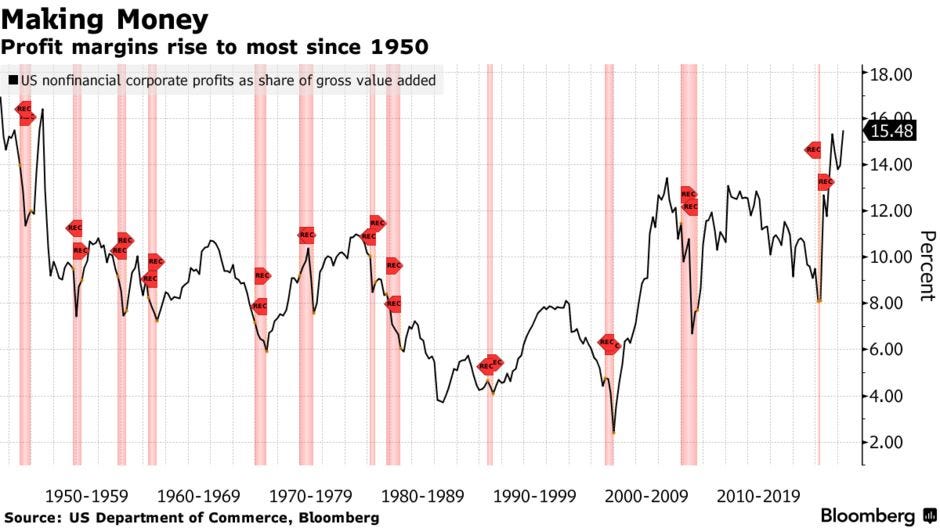Jerome Powell continues to battle the wrong inflation culprit
It's going to cause massive and unnecessary pain
Today at Jackson Hole, Wyoming, Fed chair Jerome Powell said that the Fed must continue to raise interest rates, even though it will “bring some pain to households and businesses.”
This, with all due respect, is nuts.
True, inflation is near a four-decade high. But the Fed’s aggressive effort to tame it through steep interest rate hikes — the fastest series of rate hikes since the early 1980s — is raising the risk of recession. Powell’s remarks signal that the Fed is likely to increase rates again in September by another three-quarter of a percent, raising the risk still further.
The pain is already being felt across the land. Wage gains haven’t kept up with inflation. This means most Americans continue to lose economic ground.
Powell is in effect telling them they’ll lose even more ground. Higher interest rates, he admits, will slow economic growth and result in “softer” labor market conditions — a euphemism for lower wage increases and fewer jobs. But “these are the unfortunate costs of reducing inflation.”
Meanwhile, though, corporate profits continue to soar. Profit margins are at their highest since 1950, according to Commerce Department figures published Thursday.
Stop for a moment and let your mind dwell on this. The prices businesses are charging their customers are outpacing whatever increased costs businesses are facing for materials and labor.
In other words, wages aren’t pushing up inflation. The costs of production aren’t pushing up inflation.
Corporations are pushing up inflation. The biggest single unique source of inflation in the United States is the pricing power of corporations.
So why is the Fed raising interest rates? Because that’s what the Fed does when prices are rising. That’s the only tool in the Fed’s toolkit. To paraphrase the old saying, when all you have is a hammer, everything looks like an interest rate.
The problem is that this puts most of the burden of fighting inflation on average working people and the poor. They are the first to lose pay and jobs as the economy slows. They’re already getting hammered.
If the Fed continues to raise rates to slow inflation, they’ll get hammered even more.
This might be justifiable if corporations were investing their windfall profits in more productive capacity — more factories, materials, warehouses, and jobs — which would expand their ability to meet future demand and thereby better guard against inflation.
But they aren’t. They’re using their profits to buy back their shares of stock so that their share values — already sagging due to the anticipated Fed-induced slowdown — won’t sag too much further.
At the beginning of the year, Goldman Sachs estimated that 2022 would see a record-breaking $1 trillion in buybacks. That’s unlikely to happen, but buybacks are continuing at a strong pace. In the second quarter, buybacks were up by about 7 percent over the year before.
Some economists argue that there’s no reason to think corporations would now exert more pricing power than they’ve had all along. Why would they wait for the costs of materials and labor to rise before increasing their profit margins?
The answer is simple. Inflation gives them cover. They can say – as many now do – that they have no choice but to raise prices in light of the rising costs of materials and labor. They’re just not advertising the fact that their profits are rising as they do so.
Which brings us to the central policy question: Why can’t the burden of fighting inflation be placed where it belongs — on big corporations that continue to raise their prices in pursuit of larger profit margins and higher share prices?
The simple answer is big corporations have so much political clout that they’d never allow the sorts of policies that would have that effect — say, a windfall profits tax, price controls, higher taxes on themselves and the wealthy, and bolder and more effective antitrust enforcement.
Although the Democrats did pass a 1 percent tax on stock buybacks in the recently enacted Inflation Reduction Act, they weren’t able to take these other steps. Not even a Democratic president and Democrats in control of both houses of Congress could overcome vested corporate interests.
So it’s all on Jerome Powell and the Fed. Which means, it’s all on working people.




It's true...corporate claims about many "shortages" of supplies and such were posed to get help from the taxpayers on one end to fund things like the PPP, and then to profit on the other end with higher prices on the shelves. Gas prices, for example...the highest majority of money gained by raising prices so ridiculously, while the government allowed it, went right into the stockholders and executives' pockets...what more do we need to know to start organizing as "we, the people" and getting back to the principles we were founded with, regarding our democratic republic foundation? Not to be ruled by money, religion, or any certain political ideology...
Jerome Powell is all about neoliberal orthodoxy. He believes that free markets left to their own devices will produce outcomes that are superior to governmental interventions. What is occurring under the Biden-Powell neoliberalism is that government is allowing giant corporations to freely pursue profit opportunities to the maximum extent. Government bails out corporations whenever profits are threatened. And of course as Stern points out capitalism can fail. The view that balanced interventions are likely to make things worse is false, so let’s stop kidding ourselves, they are out to get the most for themselves.